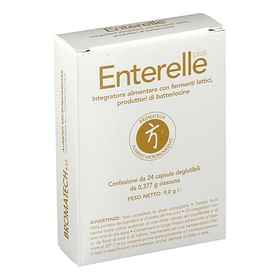Deaflor
Integratore alimentare a base di probiotici e prebiotici. Favorisce il riequilibrio della flora intestinale, aiuta a contrastare le infezioni batteriche e a risolvere i problemi correlati alla presenza di agenti patogeni.
I probiotici sono preziosi alleati dell'organismo nel ripristinare la fisiologica flora intestinale danneggiata o compromessa, anche in seguito a terapie antibiotiche.
- Inibiscono la crescita e la proliferazione dei batteri anaerobi patogeni associati alla vaginosi, ponendosi come loro antagonisti;
- grazie al processo di co-aggregazione, neutralizzano la capacità dei batteri patogeni di aderire ai tessuti, danneggiandoli, e impediscono loro di esplicare azioni dannose per l'organismo;
- hanno un importante ruolo nella stimolazione e della produzione di lattobacilli;
- aiutano a risolvere più velocemente gli episodi diarroici;
- hanno effetto inibitore sulla capacità di adesione alla mucosa di E.Coli, E.Faecalis, Candida Albicans e moltissimi altri germi;
- contrastano l'accumulo di scorie ossidative, favorendo il rinnovamento cellulare;
- i bifidobatteri migliorano il metabolismo del calcio e contribuiscono ad ostacolare l'Osteoporosi e a combattere l'eccesso di colesterolo.
Non contiene glutine.
Ingredienti
FOS (Frutto-oligosaccaridi), alga Klamath, Lactobacillus rhamnosus, Lactobacillus acidophilus DDS-1, Bifidobacterium bifidum, Lactobacillus bulgaricus DDS-14.
Modalità d'uso
Si consiglia l'assunzione di tre capsule al giorno, ai pasti.
Avvertenze
Tenere fuori della portata dei bambini. Non superare le dosi consigliate. Gli integratori non vanno intesi come sostituti di dieta variata ed equilibrata e di un sano stile di vita. Per donne in gravidanza o in allattamento e bambini si raccomanda di sentire il parere del medico.
Conservazione
Conservare il prodotto ad una temperatura compresa tra i 10°C e i 20°C.
Formato
Confezione 180 capsule da 425 mg.
Bibliografia:
Lactobacillus rhamnosus
- Salminen, Seppo; Lee, Yuan C., Handbook of probiotics and prebiotics (in en), Chichester, John Wiley & Sons, 2009, pp. 596. ISBN 0-470-13544-1
- Philip D. Marsh BSc PhD, Oral Microbiology (in en), Edinburgh, Churchill Livingstone, 2009, 35, 112. ISBN 0-443-10144-2
- Handbook of Fermented Functional Foods, Second Edition (Functional Foods and Nutraceuticals) (in en), Washington, DC, Taylor & Francis, 2008, pp. 581. ISBN 1-4200-5326-4
- Preedy, Victor R.; Watson, Ronald R., Bioactive Foods in Promoting Health: Probiotics and Prebiotics (in en), Boston, Academic Press, 2010. ISBN 0-12-374938-7
- Ercolini, Danilo; Cocolin, Luca, Molecular techniques in the microbial ecology of fermented foods (in en), Berlin, Springer, 2008, pp. 280. ISBN 0-387-74519-X
- Salminen, Seppo; Wolfgang Kneifel, Probiotics and Health Claims (in en), Wiley-Blackwell, 2011, pp. 340. ISBN 1-4051- 9491-X
- Min-tze Liong, Probiotics: Biology, Genetics and Health Aspects (Microbiology Monographs) (in en), Berlin, Springer, 2011, pp. 327. ISBN 3-642-20837-1
- Mohamed Ahmedna; Ipek Goktepe; Vijay K. Juneja, Probiotics in Food Safety and Human Health (in en), Boca Raton, CRC, 2005, pp. 463. ISBN 1-57444-514-6
- Terry Finocchiaro; Susan Sungsoo Cho, Handbook of Prebiotics and Probiotics Ingredients: Health Benefits and Food Applications (in en), Boca Raton, CRC, 2009, pp. 435. ISBN 1-4200-6213-1
- Prebiotics and Probiotics Science and Technology, Springer, 12 agosto 2009, 986–. ISBN 978-0-387-79057-2
- Biotechnology of Lactic Acid Bacteria: Novel Applications, John Wiley & Sons, 6 aprile 2010, 346–. ISBN 978-0-8138-1583-1
Per quanto riguarda l'utilizzo del Lactobacillus rhamnosus nel contrastare il Morbo di Crohn si veda
- Shen, J., HZ. Ran; MH. Yin; TX. Zhou; DS. Xiao (febbraio 2009). Meta-analysis: the effect and adverse events of Lactobacilli versus placebo in maintenance therapy for Crohn disease.. Intern Med J 39 (2): 103-9. DOI:10.1111/j.1445- 5994.2008.01791.x. PMID 19220543.
- Bousvaros, A., S. Guandalini; RN. Baldassano; C. Botelho; J. Evans; GD. Ferry; B. Goldin; L. Hartigan; S. Kugathasan; J. Levy; KF. Murray (settembre 2005). A randomized, doubleblind trial of Lactobacillus GG versus placebo in addition to standard maintenance therapy for children with Crohn's disease.. Inflamm Bowel Dis 11 (9): 833-9. PMID 16116318.
- Braat, H., J. van den Brande; E. van Tol; D. Hommes; M. Peppelenbosch; S. van Deventer (dicembre 2004). Lactobacillus rhamnosus induces peripheral hyporesponsiveness in stimulated CD4+ T cells via modulation of dendritic cell function.. Am J Clin Nutr 80 (6): 1618-25. PMID 15585777.
- Prantera, C., ML. Scribano (settembre 2002). i>Probiotics and Crohn's disease.. Dig Liver Dis34 Suppl 2: S66-7. PMID 12408444
Per l'utilizzo contro la colite ulcerosa si rimanda a
- Bränning, CE., ME. Nyman (gennaio 2011). Malt in combination with Lactobacillus rhamnosus increases concentrations of butyric acid in the distal colon and serum in rats compared with other barley products but decreases viable counts of cecal bifidobacteria.. J Nutr 141 (1): 101-7. DOI:10.3945/jn.110.122226. PMID 21106924.
- Do, VT., BG. Baird; DR. Kockler (marzo 2010). Probiotics for maintaining remission of ulcerative colitis in adults.. Ann Pharmacother 44 (3): 565-71. DOI:10.1345/aph.1M498. PMID 20124461.
- Heilpern, D., A. Szilagyi (settembre 2008). Manipulation of intestinal microbial flora for therapeutic benefit in inflammatory bowel diseases: review of clinical trials of probiotics, pre-biotics and synbiotics.. Rev Recent Clin Trials 3 (3): 167-84. PMID 18782075.
- Lorea Baroja, M., PV. Kirjavainen; S. Hekmat; G. Reid (settembre 2007). Anti-inflammatory effects of probiotic yogurt in inflammatory bowel disease patients.. Clin Exp Immunol 149 (3): 470-9. DOI:10.1111/j.1365-2249.2007.03434.x. PMID 17590176.
- Gosselink, MP., WR. Schouten; LM. van Lieshout; WC. Hop; JD. Laman; JG. Ruseler-van Embden (giugno 2004). Delay of the first onset of pouchitis by oral intake of the probiotic strain Lactobacillus rhamnosus GG.. Dis Colon Rectum 47 (6): 876- 84. DOI:10.1007/s10350-004-0525-z. PMID 15108026.Valutazioni e recensioni
Ancora nessuna recensione disponibile




